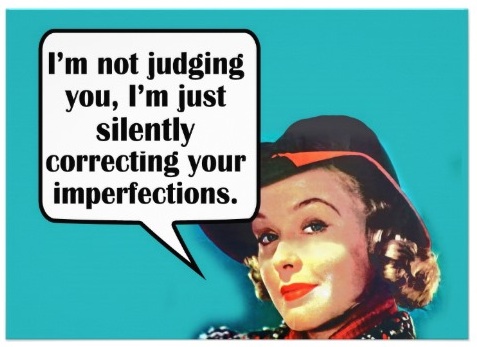The Emotional Dangers of Judging and How to Stop

 Do you find yourself often judging others and criticizing them? Are you also critical of yourself? You may have formed a habit of judgmental thinking that you didn’t realize you had.
Do you find yourself often judging others and criticizing them? Are you also critical of yourself? You may have formed a habit of judgmental thinking that you didn’t realize you had.
Judging is a common issue and can have negative emotional consequences. Although some level of criticism is normal, frequently judging others or yourself can lead you down the path of negativity, suffering, and misery.
Learn the emotional effects of judging:
1. You decrease your own happiness. Judging usually involves negative emotions. You focus on the negative qualities you see in others and yourself. You miss out on the positive aspects.
- This leads to dissatisfaction with the world, your life, your friends, and other things.
2. You hurt others, and harm yourself in the process. Because of the negative feelings you cause when you judge or criticize, you can destroy friendships and relationships. You can sabotage connections at work or other places. Life can become very difficult.
3. You become more critical of yourself.One of the worst negative emotional effects of a judgmental mindset is that you criticize yourself as well as others. Your self-talk becomes very negative as you mentally beat yourself up, and your self-confidence plummets.
Tips to Avoid Judging
If you’re struggling with a judgmental mindset, take heart! Whether you’re criticizing another person or feeling bad about yourself, you can break the cycle. You don’t have to remain in the pain that it causes.
Use this process to avoid judging yourself and others:
1. Notice when you’re judging. The first step is to recognize how many of your thoughts and feelings are judgmental. Monitor your thoughts. Notice how much time you spend on judging and criticizing, both yourself and others.
- Once you learn to recognize a critical thought as soon as it happens, counteract the negative thought with a positive one.
2. Recognize the feelings.You probably don’t enjoy being judged by others, and remembering these feelings can help you avoid doing it yourself. To help you be more patient, keep in mind that everyone’s human and will make mistakes from time to time.
- Instead of jumping to negative conclusions, look for positive qualities.
3. Remind yourself that you can’t see the whole story. No one can see into another person’s soul and read their past! In fact, you most likely don’t know why they think or behave the way that they do.
- For example, you may be critical of someone who eats a lot of junk food and struggles to lose weight. You may feel this person isn’t leading a healthy life, and you know some simple changes can help them. However, you aren’t aware of the real reason they eat, such as emotional issues or years of abuse.
- When you find yourself being critical, remember that you don’t know their story. Give them the benefit of the doubt. They may have perfectly valid reasons for their thoughts or actions.
4. Practice acceptance. Everyone has faults, idiosyncrasies, and issues. Learn to accept these challenges you see in others without judging them or making them feel bad.
- Work toward accepting your own faults as well. Perfectionism is overrated and unachievable. Errors can teach you more than success.
- Acceptance can lead you to sympathy and empathy. It can also open up the doors for you to truly connect with others. Practice acceptance and you’ll be pleasantly surprised by the results!
Judging makes life more difficult and interferes with your wellbeing. You end up creating pain and suffering that isn’t necessary. You miss out on the good and positive qualities in others and in yourself.
Alternatively, you can turn on joy in your life when you take steps to become more accepting!
CLICK HERE to Explore/ Our Free Online Courses
Responses